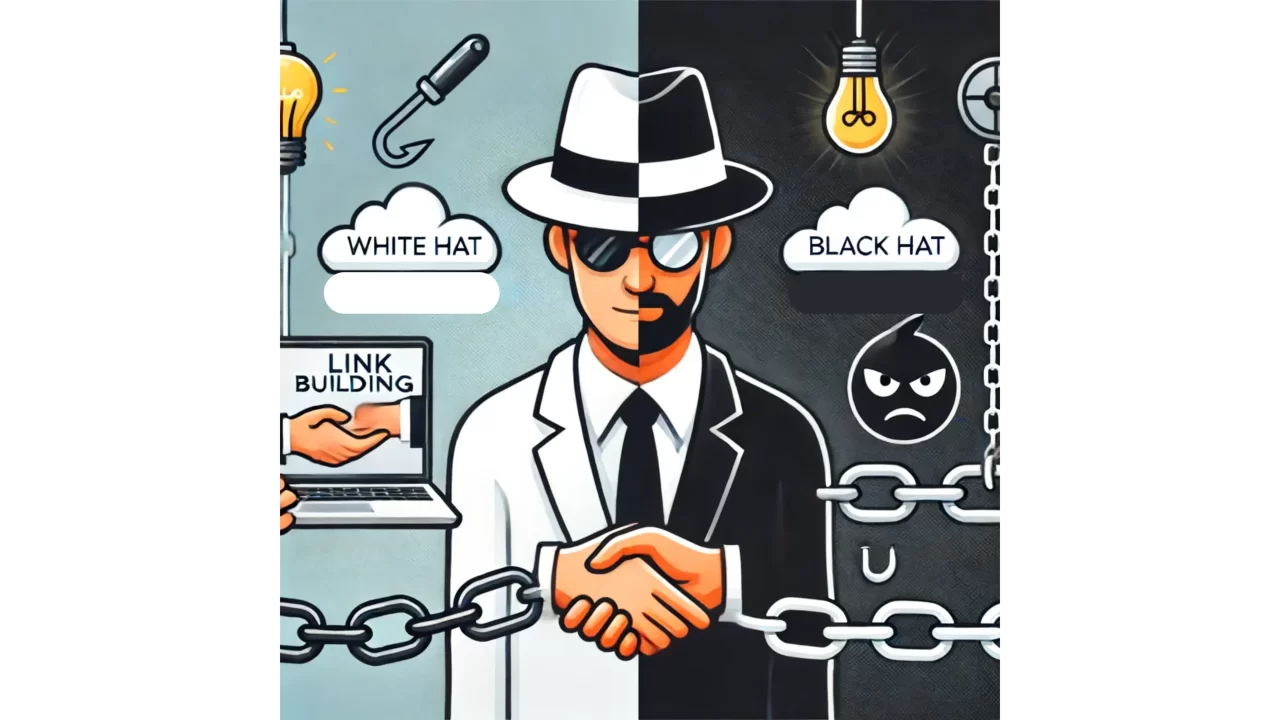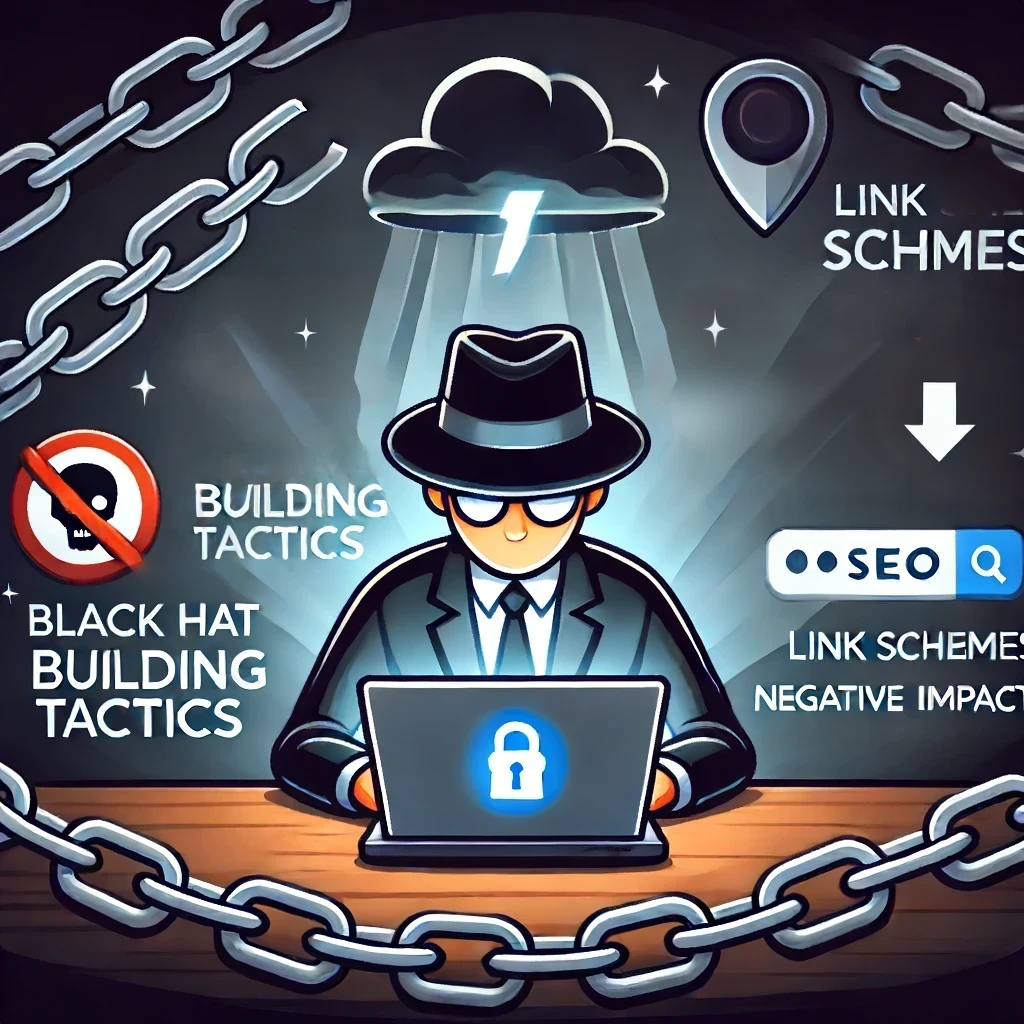Link building is key to improving SEO and boosting organic traffic. However, not all strategies are ethical. Ethical link building (white hat SEO) builds strong Google rankings, credibility, and sustainable growth. Unethical tactics (black hat SEO) can harm your site’s reputation and long-term success. Know the difference to protect your site. White hat SEO involves high-quality content that naturally attracts backlinks and follows Google’s guidelines. Black hat tactics manipulate search engines with spammy techniques like keyword stuffing and cloaking. While black hats may offer short-term gains, they also risk penalties and bans.
Understanding the difference between white hat and black hat link building can be confusing, especially for those just starting in SEO. White hat SEO practices involve creating high-quality content that naturally attracts backlinks and adheres to Google’s guidelines. In contrast, black hat link building tactics manipulate search engines through spammy techniques like keyword stuffing, cloaking, and using private blog networks (PBNs). While black hat strategies may provide short-term improvements in search engine rankings, they come with significant risks and consequences, such as penalties from search engines and potential website banning.
Key Takeaways
- Link building is critical to SEO, but website owners must recognize the ethical implications of white hat vs. black hat strategies.
- White hat SEO promotes sustainable growth through quality content, while black hat tactics can lead to penalties from search engines and potential website bans.
- Understanding the differences between these strategies is crucial for devising an effective, ethical SEO approach that protects your site’s reputation and online presence.
Understanding Ethical Link Building
Regarding link building, it’s important to focus on ethical practices, known as white hat SEO. In contrast, black hat link building techniques disregard search engine guidelines and prioritize quick results over sustainable growth. Let’s dive into understanding what makes a link building strategy ethical and why it should be the focus of your digital marketing efforts.
White hat link building refers to the ethical and approved techniques used to acquire backlinks for a website in line with search engine guidelines. This approach prioritizes providing genuine value to users and building authentic relationships with other reputable websites. By employing white hat methods, you ensure long-term, sustainable online growth without the risk of penalization from search engines.
Here are some key characteristics of ethical link building:
- User-focused: White hat strategies place a strong emphasis on user experience. They aim to create content that addresses users’ needs, is well-researched, and visually appealing. This establishes trust and credibility with your audience, leading to higher rankings on search engine results pages (SERPs).
- Genuine relationships: Collaborating with reputable websites and brands is fundamental to ethical link building. Cooperation with trustworthy partners strengthens your link profile and enhances the visibility and reputation of your business in the industry.
- Compliance with search engine guidelines: Ethical link builders follow guidelines set by search engines like Google, ensuring their methods are compatible with search algorithms and will not result in penalties or delistings.
- Long-term approach: While black hat techniques might offer quick results, they ultimately lead to negative consequences. White hat link building focuses on sustainability, helping your website maintain its rankings and visibility over time.
To implement ethical link building, consider the following tactics:
- Quality content creation: Craft engaging and informative content that addresses the pain points of your target audience and encourages other websites to link back to you.
- Guest blogging: Contribute valuable content to authoritative blogs or websites in your niche, gaining exposure and backlinks to your site.
- Resource links: Offer useful resources on your website that others will naturally want to link to, such as guides, templates, or industry insights.
- Influencer outreach: Develop relationships with key industry influencers who may promote your content and create backlinks to your website.
- Link reclamation: Identify and reclaim lost or broken backlinks to restore their value and improve your site’s overall link profile.
By adhering to white hat SEO practices and focusing on ethical link building, you can confidently navigate the digital landscape, ensuring sustainable online growth while avoiding the pitfalls of black hat tactics.
White Hat SEO Practices
Content Creation
White hat SEO practices focus on ethical and legitimate techniques that adhere to search engine guidelines. One crucial aspect of white hat SEO is content creation. Your aim should be to produce high-quality, valuable content for your target audience. This includes writing well-researched articles, creating informative infographics, and offering insightful resources. By doing so, you not only enhance the user experience but also naturally attract authoritative backlinks.
To ensure your content stands out, consider the following:
- Originality: Provide unique insights or perspectives instead of rehashing existing content.
- Relevance: Address the needs and interests of your target audience.
- Readability: Ensure your content is well-structured and easy to consume.
Guest Blogging
Another effective white hat SEO practice is guest blogging. Contributing valuable content to reputable websites within your niche can earn high-quality backlinks and enhance your online visibility. To succeed in guest blogging, consider these points:
- Target Selection: Focus on authoritative websites with engaged audiences that align with your niche.
- Personalized Outreach: Craft a genuine message demonstrating your knowledge of the host website’s content and audience.
- Value Proposition: Offer high-quality, relevant content that their audience would find valuable.
Remember, guest blogging is about building relationships and adding value to the host website, not just acquiring backlinks.
Broken Link Building
Broken link building is another ethical technique to acquire backlinks in white hat SEO. This involves finding broken links on relevant websites, creating content that replaces the inaccessible resource, and reaching out to the website owner to suggest replacing the broken link with your new content.
To effectively utilize broken link building, follow these steps:
- Use tools like Ahrefs or Screaming Frog to identify broken links on your target websites.
- Analyze the content of the original link and create an updated, superior version.
- Contact the website owner with a polite and helpful message, offering your content to replace the broken link.
By engaging in ethical link building practices like content creation, guest blogging, and broken link building, you can improve your website’s search engine ranking while adhering to white hat SEO guidelines.
Black Hat Link Building Tactics
In this section, we’ll discuss some common black hat link building tactics you should know. Although seemingly effective in the short term, these methods can negatively affect your website and reputation in the long run.
Link Farms
Link farms are a network of websites that are created solely to exchange backlinks. These websites often contain low-quality or duplicate content, and their main purpose is to boost the search engine ranking of the participating websites artificially. Participating in link farms can lead to search engine penalties or even a complete ban from the search results, so it’s best to avoid them.
Cloaking
Cloaking is a deceptive technique where a website displays different content to search engine crawlers and human visitors. This tactic aims to manipulate search engines into ranking the website higher than it deserves by presenting them with keyword-rich content while still showing more appealing content to the users. This practice goes against search engine guidelines and can result in severe penalties.
Keyword Stuffing
Keyword stuffing is another example of a black hat link building tactic. This involves overloading your website’s content with specific keywords to manipulate search engine algorithms into ranking your website higher in search results. Using keywords usually results in a positive user experience, as the content becomes difficult to read and understand.
To protect your website’s reputation and maintain a positive user experience, it is crucial to focus on ethical link building strategies, such as white hat SEO practices.
The Risks and Consequences of Black Hat SEO
As you delve into the world of link building, it’s crucial to understand the risks and consequences associated with black hat SEO practices. These tactics involve manipulative and deceptive techniques to game search engine algorithms, going against guidelines set by search engines like Google. While they may provide short-term success, black hat SEO strategies can negatively affect your website.
Here are some of the main risks involved with black hat link building:
- Penalties from search engines: Utilizing black hat techniques can result in search engines imposing penalties on your website, ultimately damaging your search rankings and online reputation.
- Loss of credibility: Black hat link building can negatively impact your website’s credibility, as users, partners, and advertisers may lose trust in your brand when they become aware of your unethical practices.
- Temporary gains: Although black hat SEO might give you a quick boost in rankings, these gains are often short-lived as search engines continue to update their algorithms to combat these tactics.
To avoid these consequences, it’s crucial to adopt white hat SEO practices when building links for your website. These techniques prioritize creating valuable content, improving the user experience, and adhering to search engine guidelines for sustainable, long-term SEO success. By focusing on ethical link building, you can ensure your website remains in the good graces of both users and search engines, ultimately leading to positive outcomes for your online presence.
White Hat vs. Black Hat: A Comparative Analysis
When it comes to ethical link building, understanding the distinctions between white hat SEO and black hat link building practices is essential. By comparing these two approaches, you can make informed decisions that ultimately benefit your online presence and adhere to search engine guidelines.
White Hat SEO focuses on long-term, sustainable growth by implementing ethical strategies that prioritize your audience’s needs and search engine guidelines. Some common white hat techniques include:
- Creating high-quality, original content
- Earning links from reputable websites through outreach, guest posting, and relationship-building
- Optimizing on-page elements, such as meta-tags, headings, and keywords
- Ensuring mobile-friendliness for ease of use and navigation on various devices
On the other hand, Black Hat SEO aims for quick wins through manipulative and deceptive practices, often violating search engine guidelines. These tactics can produce short-term results but pose risks, as search engines may penalize or even ban sites found employing black hat techniques. Common black hat methods include:
- Participating in link schemes, such as buying or selling links2
- Keyword stuffing3
- Cloaking or presenting different content to search engines and users
- Creating low-quality or duplicate content4
| White Hat SEO | Black Hat SEO | |
| Approach | Ethical, sustainable growth | Quick wins through shortcuts |
| Risks | Low | High potential penalties5 |
| Focus | User experience, guidelines | Manipulation, deception |
By adhering to white hat SEO practices, you invest in your website’s long-term success and visibility, fostering trust and authority in your niche. While it may require patience and diligence, building a strong foundation ultimately benefits your online presence and users’ experience.
Conversely, employing black hat link building practices may yield short-term results but place your website at risk for penalties or even removal from search engine results pages. By valuing manipulation over genuine value and relevance, black hat methods undermine user experience and disregard search engine guidelines.
In conclusion, as you navigate link building and SEO strategies, you must remain mindful of ethical practices and choose methods prioritizing user experience, trust, and adherence to guidelines. Doing so can build a strong online presence that delivers consistent, sustainable results.
Footnotes
- Ethical SEO: Comparing Black Hat And White Hat Link Building – LinkedIn ↩
- The Ethics of SEO: White Hat vs. Black Hat Techniques ↩
- White Hat vs Black Hat SEO – Key Differences & Best Practices ↩
- White Hat vs Black Hat SEO: Link Building Guide – GrowthRocks ↩
- White Hat vs. Black Hat SEO: Our Users-First Approach to Ethics in SEO – Clearscope ↩
How Search Engines Respond to Link Building Strategies
Search engines like Google aim to provide users with the most relevant and high-quality search results. They consider several factors to achieve this, including the number and quality of backlinks pointing to a website. White hat link building techniques are favored by search engines as they adhere to the guidelines and prioritize providing genuine value to users.
On the other hand, black hat link building techniques involve spammy and manipulative tactics designed to deceive search engines. These methods may lead to short-term gains in search rankings, but search engines will eventually discover and penalize them.
When assessing link building strategies, search engines consider the following factors:
- Link Relevance: The relevance of the linking page and its content to the content on the linked page.
- Link Authority: The trustworthiness and credibility of the linking website are usually measured by metrics like Domain Authority (DA) and Page Authority (PA).
- Link Quantity: The number of links pointing to a specific website or page can indicate its importance, although high-quality links are prioritized over sheer numbers.
Focusing on the quality of your backlinks in your link building efforts is crucial. Techniques such as creating compelling content, forming strategic partnerships with related websites, and employing personalized outreach are examples of ethical link building that can lead to long-term, sustainable online growth.
To help maintain your website’s search engine rankings and abide by ethical SEO practices, adopt the following white hat techniques:
- Use high-quality, original content that offers value to your readers and encourages natural linking from other sources.
- Engage in partnerships with reputable websites in your industry, especially those with high authority.
- Contact website owners and writers with personalized outreach, offering your expertise or content in exchange for a mention and a link.
By employing these methods, you’ll ensure your website’s success in search engines without risking penalties and damaging your online reputation.
Best Practices for Sustainable Link Building
To ensure your link building efforts remain ethical and effective, adhere to white hat SEO practices. These strategies prioritize organic and sustainable methods, keeping with search engine guidelines. Keep in mind the following best practices for sustainable link building:
- Create high-quality content: Focus on generating informative, relevant, and engaging content that naturally attracts backlinks from reputable and authoritative sources.
- Guest posting: Offer to write insightful articles or blog posts for other industry-related websites. Make sure to include a link back to your site, creating a mutually beneficial exchange.
- Engage in professional networking: Build relationships with professionals in your field and share valuable insights and resources. This can lead to collaborations and backlinks from industry-leading websites.
- Utilize social media: Share your content on various social media platforms to increase visibility and engagement. This can gain the attention of potential backlink partners.
- Participate in online forums and communities: Engage in discussions and provide valuable contributions to relevant forums or communities where your target audience is active. Remember to include a link to your site whenever appropriate.
Avoid black hat link building techniques, which are unethical practices that aim to manipulate search engine rankings. Some examples to avoid are:
- Buying or selling links for ranking purposes
- Excessive link exchanges
- Using automated programs or services to create links to your site
By following white-hat link building strategies and avoiding black hat pitfalls, you can sustainably improve your website’s rankings and traffic while maintaining your site’s integrity.
Frequently Asked Questions
What are the primary differences between white and black hat link building techniques?
White hat link building techniques are ethical and comply with search engine guidelines. They focus on generating high-quality content and establishing genuine relationships with relevant websites, resulting in a consistent increase in website traffic and rankings. On the other hand, black hat link building involves exploiting loopholes and engaging in manipulative practices, such as buying or selling links, which can lead to short-term gains. Still, it may result in severe penalties or even website removal from search engine results.
How can white hat SEO practices improve long-term website visibility?
White hat SEO practices focus on providing value for users and adhering to search engine guidelines. Your website will naturally gain visibility and rankings over time by consistently creating high-quality content and establishing relevant, authoritative links. Moreover, search engines, like Google, recognize and reward ethical practices, leading to improved long-term performance and a reduced risk of penalties.
What risks are associated with using black hat link building strategies?
Black hat link building strategies carry significant risks, including penalties from search engines, lowered search rankings, and potential de-indexing of your website. Moreover, these practices can damage your online reputation and fail to build user trust. Engaging in unethical link building ultimately undermines the long-term success of your website.
What criteria should be used to evaluate the ethical implications of a link building campaign?
To evaluate the ethical implications of a link building campaign, consider the following criteria:
- Compliance with search engine guidelines.
- Transparency of methods and processes employed.
- Focus on providing value for users through high-quality content and relevant links.
- Genuine relationships with other websites that respect mutually beneficial collaboration.
By adhering to these principles, you can ensure an ethical and successful link building campaign.
How can web admins ensure compliance with search engine guidelines while building links?
Web admins can ensure compliance with search engine guidelines by:
- Familiarizing themselves with search engine policies, like Google’s Webmaster Guidelines.
- Monitoring link profiles to identify and avoid low-quality or spammy links.
- It is creating high-quality, engaging content that attracts organic links from authoritative sources.
- Regularly audit and update on-site and off-site SEO practices to stay current with evolving guidelines.
These best practices help maintain a healthy link profile and prevent search engine penalties.
What are some common penalties for websites that engage in unethical link building?
Common penalties for websites that engage in unethical link building include:
- Manual actions from search engines may cause a decrease in rankings or removal of pages from search engine results.
- Algorithmic adjustments, where search engines automatically demote websites using black hat techniques in their rankings.
- De-indexing the entire website leads to a complete loss of visibility in search results.
- Loss of credibility and trust can negatively impact the website’s reputation.
By avoiding unethical link building strategies and focusing on white hat practices, you can minimize the risk of these penalties and achieve long-lasting success for your website.





